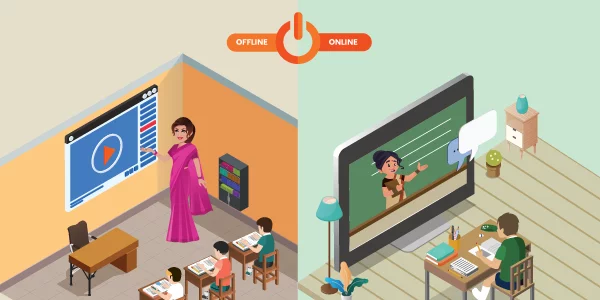Reimagining English to meet challenges of hybrid education

Give Your School The Lead Advantage
Recent events have accelerated the sea change education in India has been witnessing. The question before all of us is how do we give it a solid foundation? A comprehensive re-envisioning of English learning is the first step.
The COVID-19 pandemic has forever changed the face of education. Online learning with the aid of digital tools will remain an inseparable part of learning even after in-person classes begin, and so we are at the dawn of the age of Hybrid Education. This throws up a huge number of challenges in terms of access and quality, as well as customisation of technology. Few subjects exemplify these challenges quite like English.
Our adoption and mastery of English for personal and professional reasons has been an integral part of our journey as Indians. However, we are nowhere close to tapping our potential in this regard, a reality aspirational parents from the low-income segment are only too aware of. A study by FSG, titled Understanding the Affordable Private School (APS) Market in India, shows that over 90% of parents prefer APSes (private unaided schools with fees under Rs 1,500/month) over government institutions due to English medium teaching, especially the “English-speaking environment” that they feel will be beneficial for their children. Consequently, school owners identify English as the key factor on which their institutions are being judged during admission time.
English: a skill, not a subject
However, the ground reality is that most private schools are lagging when it comes to equipping their students with the right kind of English training. The reason is quite simple: English continues to be taught as a subject rather than as a medium. Most schools have not been able to provide the English-rich environment needed for students to truly adopt the language, as opposed to learning the rules by rote. With this in mind, imagine the disruption caused by the past 12 months of the pandemic. Many students were cut off from the only place they could have access to English: their schools.
This lack of robust English teaching methods has a domino effect as it affects students’ learning of other disciplines as well. Unless students learn English as a skill rather than as a subject, they will not be able to make the connections to learn other disciples in a comprehensive way.
It is here that LEAD School’s integrated education solutions, especially its ELGA (english language and General Awareness) approach, makes all the difference. ELGA upends all conventional notions of English learning, wherein students master the language based on their skill level rather than their age. In ELGA’s multi-age classrooms, students get the chance to master 21 levels of skill in English with the focus being on not just speaking skills but also phonics, grammar and reading, and listening comprehension. The student thus experiences education as an evolving process and gets to see regular success and progress, transforming how they learn other subjects too.
ELGA is also specifically attuned to our contemporary reality ie. Hybrid Education. As classes resume, we can expect a fair amount of chaos in schedules with learning happening through a mix of offline and online modes. The ELGA approach provides for online classes and a curriculum with systematic learning outcomes based on progress in multiple indicators. But the need of the hour is for more than mere online classes. Students and teachers need the right kind of support to ensure learning outcomes are met and remedial action is taken where necessary.
This is where LEAD School’s Academic Excellence teams come in.
LEAD’s transformative grassroots work
Once a school adopts the LEAD solution, teams of educationists, teachers, and experts from LEAD School provide on-the-ground support and training to teachers, while collecting feedback and analysing data at a granular level. This enables tweaking of lesson plans wherever necessary and providing the best classroom experience to students. Let me illustrate the effectiveness of this evidence-based approach with a simple example.
At the height of the pandemic, amid the pressure of learning online, our teams found that students in some schools in the North found English lessons way easier to process if there were a few Hindi words mixed in the module. A simple fix, which we call the sandwich method, entailed delivering English lessons parceled in Hindi communication. This ‘Hinglish’ delivery of lessons made a huge impact in the way the students learnt the subject as they were already familiar and comfortable with their mother tongue. Such changes, both at a micro and macro level, combine to form a continuous process of evolution and learning at the level of students, teachers, administrators and for us enablers as well.
In a few years, education in India will almost be unrecognisable from the pre-pandemic times. At LEAD School, our pursuit will be towards refining and perfecting our integrated approach, bringing together all stakeholders to forge a new path and adopt transformatory methods to improve learning outcomes. Our future as a society depends on it.
LEAD is transforming schools by making children future-ready. To make yours a LEAD powered school: Partner with us today

